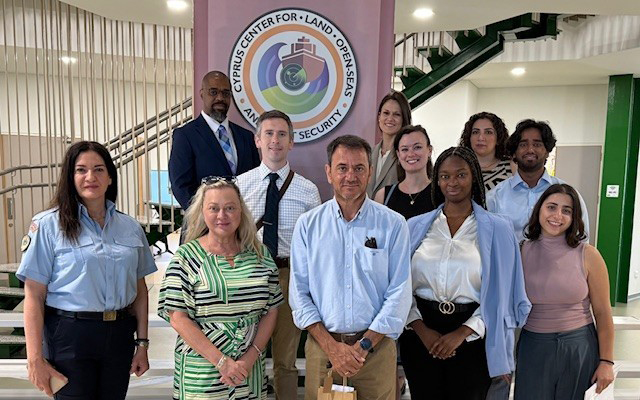In This Story

Students from George Mason University’s Schar School of Policy and Government recently returned from an intensive study-abroad program in Cyprus, where they examined the Eastern Mediterranean’s shifting geopolitical landscape and human security challenges.
Led by Schar School professor Ellen Laipson, director of the master of international security program (ISEC), and Michal McElwain Malur, director of external programs, the course blended rigorous academic study with direct engagement with diplomats, policymakers, security officials, and civil society organizations.
High-level diplomatic engagement was a hallmark of the program. Before departing, students visited the Embassy of Cyprus in Washington, D.C., to meet Ambassador Evangelos Savva. In Cyprus, briefings at the Ministry of Foreign Affairs offered insights into the island’s strategic role in regional diplomacy. A highlight was meeting Carter Wilbur, a George Mason alumn and acting political-economic chief at the U.S. Embassy in Nicosia, who shared perspectives on U.S. policy and economic interests in Cyprus.
Security institutions and regional preparedness were other key focuses. The class visited facilities underscoring Cyprus’s role in regional security, including the Cyprus Center for Land, Open-Seas, and Port Security (CYCLOPS), a U.S.-Cyprus initiative serving as a regional hub for training in border security, customs enforcement, and cybersecurity.
Students also toured the Cyprus Joint Rescue Coordination Center (JRCC), which coordinates maritime and aerial search and rescue operations. During their visit, the JRCC was actively managing evacuations following U.S. bombings in Iran—a vivid example of Cyprus’s role as a regional humanitarian hub.
The program emphasized peacebuilding efforts on the island. Students visited the United Nations Buffer Zone and met with representatives from the United Nations Peacekeeping Force in Cyprus (UNFICYP). They toured the Home for Cooperation, an NGO fostering dialogue between Greek Cypriot and Turkish Cypriot communities and visited the Committee on Missing Persons (CMP) Anthropological Laboratory, where a bi-communal team works to identify and return remains of individuals missing since the island’s 1974 division.
Beyond field visits, students attended lectures covering topics such as great power politics in the Eastern Mediterranean, Turkish Cypriot politics and economic developments since 1974, regional conflicts and their global implications, climate change and environmental security, energy developments, international law, and the transnational challenges of migration and climate.
“Offering these study-abroad experiences is essential to equipping our students with the knowledge, skills, and global awareness they need to become effective leaders and practitioners in policy and international affairs,” said Malur.
While the week was academically demanding, students also explored Cyprus’s archaeological sites in Kourion and Paphos to experience firsthand the island’s nearly 13,000 years of history. The program concluded with a scenic boat cruise along the coast—a well-deserved moment of reflection.
Students praised the program for its immersive, real-world learning.
“Seeing the JRCC coordinating evacuations in real time as the United States bombed Iran really connected our studies to human security needs,” said Sarah Bassil, an ISEC student who was herself evacuated through Cyprus from Lebanon in 2006.
“Our group enjoyed lectures from leading experts, intensely engaging field visits, and great camaraderie among our diverse student group. Cyprus is an intriguing case study,” added John Thacker, another ISEC student.
As geopolitical tensions continue to shape the Eastern Mediterranean, Schar School students return to George Mason with invaluable insights and a deeper understanding of how regional dynamics intersect with global security.
For more information on Schar’s study-abroad offerings, visit the Schar School study abroad page.
